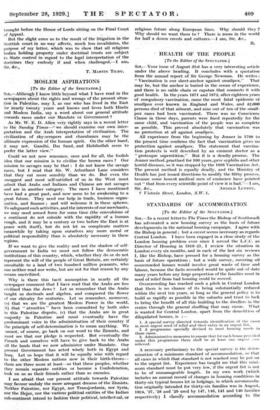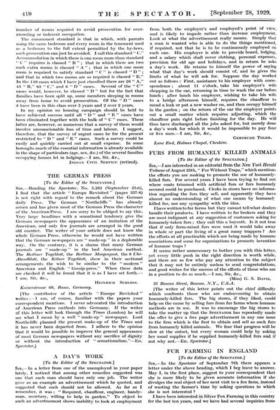STANDARDS OF ACCOMMODATION [To the Editor of the SPECTATOR.] SIR,—In
a recent letter to The Times the Bishop of Southwark has advocated a new housing survey as the basis of future developments in the national housing campaign. I agree with the Bishop in general ; but a caveat seems necessary as regards Central London. I have been engaged-in a close study of the London housing problem ever since I served the L.C.C. as Director of Housing in 1919-21, I review the situation in London every six months, and in each of the last six reviews I, like the Bishop, have pressed for a housing survey as the basis of future operations ; but a wide survey, covering all overcrowded houses would involve great waste of time and labour, because the facts recorded would be quite out of date many years before any large proportion of the families most in need of relief from bad housing could be moved.
Overcrowding has reached such a pitch in Central London that there is no chance of its being substantially reduced within the next ten years, so long as the general policy is to build as rapidly as possible in the suburbs and trust to luck to bring the benefit of all this building to the dwellers in the centre through the general shuffling that may ensue. Ilhat is wanted for Central London, apart from the demolition of dilapidated houses, is :-
I. A special survey directed towards identification of the cases in most urgent need of relief and their entry in an urgent list.
2. A programme specially devised to meet housing needs in these cases.
3. Administrative measures to ensure that for each house provided under this programme there shall be at least one urgent ease relieved.
A necessary preliminary to the special survey is the deter- mination of a minimum standard of accommodation, so that all cases in which that standard is not reached may be put on to the urgent list. Experience has taught me that this mini- mum standard must be put very low, if the urgent list is not to be of unmanageable length. In my own work (which includes an annual record of changes in housing conditions in thirty-six typical houses let in lodgings, in which accommoda- tion originally intended for thirty-six families was in August, 1924, '27, '28 and '29 used by 147, 143, 141 and 144) families respectively) I classify accommodation according to the
'number of rooms required to avoid prosecution for over- -crowding or indecent occupation.
The commonest standard is that in which, -with parents using the same bedroom and every room in the tenement used as a bedroom to the full extent permitted by the by-laws, such prosecution can just be avoided. I call this standard " C." Accommodation in which there is one room more than standard C " requires is classed " B " ; that in which there are two such extra rooms is classed " A " ; that in which one more room is required to satisfy standard " C " is classed " D " ; and that in which two rooms are so required is classed " E." In the 140 cases which I have just classified there are 26 " A," 45 " B," 63 " C," and 6 " D " cases. Several of the " C" cases would, however, be classed " D " but for the fact that families have been split up, some members sleeping in rooms away from home to avoid prosecution. Of the " D " cases 4 have heel in this class over 5 years and 2 over 2 years.
In my opinion no housing campaign should be held to have achieved success until all " D " and " E " cases have been eliminated together with the bulk of " C " cases. These latter are, however, so numerous that a survey of them would involve unconscionable loss of time and labour. I suggest, therefore, that the survey of urgent cases be for the present restricted to " D " and " E " cases. Such a survey could be easily and quickly carried out at small expense. In some boroughs much of the essential information is already available in the shape of particulars (age, sex, &c.) of the several families occupying houses let in lodgings.—I am, Sir, &c.,
INDIAN CIVIL SERVICE (retired).



































 Previous page
Previous page